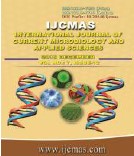


 National Academy of Agricultural Sciences (NAAS)
National Academy of Agricultural Sciences (NAAS)

|
PRINT ISSN : 2319-7692
Online ISSN : 2319-7706 Issues : 12 per year Publisher : Excellent Publishers Email : editorijcmas@gmail.com / submit@ijcmas.com Editor-in-chief: Dr.M.Prakash Index Copernicus ICV 2018: 95.39 NAAS RATING 2020: 5.38 |
The present study was carried out during Late kharif, 2016 at College of Horticulture, Anantharajupeta. The experiment was conducted with an objective to identify divergent genotypes to be used as donor parents in crop improvement. Thirty-two genotypes along with two checks were evaluated in a randomized block design with three replications and the data on 25 yield and yield attributing traits were recorded. The analysis of variance revealed significant differences among all genotypes indicating the presence of sufficient amount of variability for the characters studied. Wide range of variability was observed for number of fruits per plant, fruit weight, fruit yield per plant, powdery mildew incidence and aphid infestation, indicating the scope for selection of suitable initial breeding material for further breeding programme. The genotypes belong to the clusters VI and III, when the D2 analysis was carried out for 24 characters which partitioned the thirty-two genotypes into 6 clusters, which are genetically divergent and hybridization between these genotypes will likely produce desirable segregants. The characters like primary branches per plant, days to first male flowering, days to first female flowering, days to 50% male flowering, days to 50% female flowering, days to first fruit harvest, days to last harvest, number of seeds per fruit, TSS, carotenoids, acidity, ascorbic acid and fruit yield per vine recorded high heritability in conjunction with high genetic advance as percent of mean, suggests the predominant role of additive genetic component in governing of these traits and improvement of these traits through simple selection can be employed in cucumber. The genotypes exhibited high variability for most of the traits like plant growth characters, fruit characters, quality and seed characters. On the basis of mean performance of the genotypes studied, in terms of earliness, yield and quality traits, the genotypes viz., A10 (JS 541367), A12 (JB 595504), A22 (IC 321367) and A30 (IC 550207) were found superior and were identified as promising lines for further crop improvement in cucumber.
 |
 |
 |
 |
 |